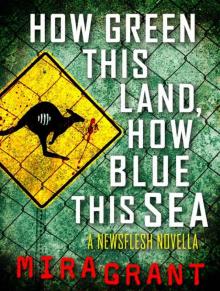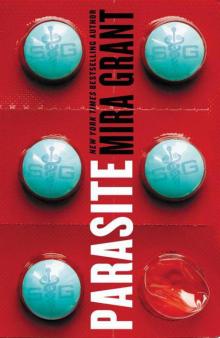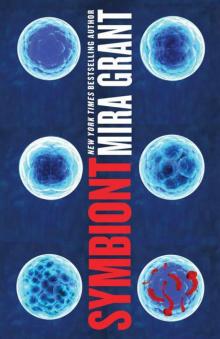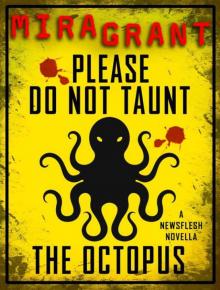- Home
- Grant, Mira
Parasite (Parasitology) Page 21
Parasite (Parasitology) Read online
Page 21
“I’ve contacted Devi’s family, since they’re local. They’re considering their options.” The bitter way he said that made it plain he didn’t expect them to come for Devi and Katherine’s bulldog. “In the meantime, Minnie is with me. My building manager says she can stay for a little while, given the circumstances, even though I’m not supposed to have pets.”
“I think… I think that’s a good thing. I’ll feel safer knowing you have a dog with you,” I said slowly. “Given the circumstances and all.”
Nathan glanced at me again. “Sal? What’s wrong?”
I took a deep breath. “Something happened with Beverly this morning,” I said before I began, haltingly, to explain the events that had started with Beverly standing stiff-legged and growling in the backyard. It took longer than I expected. Even with me refusing to leave anything out, Nathan kept asking me questions, making me back up, and finding the things I wasn’t saying. By the time I finished, I was trembling all over, a deep, bone-weary shake that seemed to start somewhere deep inside my chest and radiate from there. I stopped talking. I couldn’t find anything else inside myself to say.
Nathan said it for me. “You did the right thing,” he said. “I don’t know that I would have had the presence of mind to call SymboGen, but after what happened last night with Devi… I wouldn’t want to involve the police with three of them when they were in their mobile state.”
There was no question as to who he meant by “them.” I shuddered, the memory of the woman on the back porch rising, uninvited, behind my eyes. “It was freaky. I didn’t know what else to do.”
“Like I said, you did the right thing. SymboGen is more equipped to deal with this sort of situation than anybody else. I just wish I knew what made them surround your house like that. I haven’t heard anything about that behavior. It makes me a little nervous, to be honest. I don’t want you to get hurt.”
“I don’t want me to get hurt either, so I think we’re in agreement.” I placed a hand on his arm. “It’s going to be okay. This lady will have the answers that we’re looking for, and then you’ll know how to start treating the sick people, and all of this will go away.” I regretted the words as soon as they were out of my mouth. We might find out what SymboGen was hiding about the sleeping sickness; we might even find a way to treat the people who were afflicted. But no answers were going to bring Devi back. My own example notwithstanding, the dead were beyond the reach of modern medical science.
Nathan nodded grimly. “Let’s hope you’re right,” he said, and kept driving.
The GPS led us off the freeway and into a rundown section of a city called Concord. From there, we drove through increasingly worn-looking streets toward our final destination. This was the heart of the Bay Area’s extended suburban sprawl, communities that grew up around San Francisco and the ports during the state’s big boom period—a period that once seemed like it was going to last forever, according to a documentary I once watched on California’s history. California had the natural resources, it had the space, and it had the drive to keep its population growing until they ran out of room. I guess they never expected to run out of cheap gas and good weather while they still had space to cram in another housing development.
Most of California’s suburban areas had gone one of two ways: they had returned to their agrarian roots, or they had begun dying a slow death through attrition and neglect. Most of the farmland around Clayton was still owned by the United States military, and so they’d gone for option number two. We drove almost three miles and didn’t pass more than a dozen cars. One old man pushed a shopping cart full of his worldly possessions along the sidewalk in front of a deserted Kmart with big yellow CLOSED banners in the windows. Everything else was still.
“We’re almost there,” said Nathan. He turned off the main road into a small shopping center where a thrift store clung to life next to a feed store as closed as the Kmart. He drove past them both, gritting his teeth as the broken pavement of the parking lot caused the car to shudder and bounce.
An abandoned bowling alley filled the back third of the lot. Nathan circled around behind it, parking out of sight of the street. I blinked at him. He shrugged and turned off the engine.
“I don’t think we necessarily want to attract more attention than we will just by being here, do you?” he asked.
“No,” I admitted. Unfastening my belt, I slung my bag back over my shoulder and got out of the car.
The air was hotter and drier in Clayton than it had been in San Francisco. I glanced at my piece of paper and then at the address painted on the back door of the old bowling alley, reassuring myself that we were really in the right place. We were. Nathan walked next to me as we approached the building, which gave no signs of being occupied. Leaves on the nearby, half-dead trees rustled in the wind. Everything else was still. We stopped just short of the bowling alley door.
“Should we knock?” I asked.
“I don’t see how else we’re going to get inside,” he said.
I swallowed hard, nodding. Then I stepped forward and rapped my knuckles lightly against the wood. I stepped back again, and we waited for someone to come to the door. And waited. And waited.
When almost ten minutes had gone by, Nathan stepped forward. He knocked much more authoritatively, almost pounding on the door. Still, no one came to answer it. When another ten minutes had gone by, he turned to me, frowning. “I think someone’s playing with us.”
“I think you may be right,” I admitted. “We should get going.”
“Agreed,” he said. Both of us turned then, to face the car, and stopped when we saw the woman sitting on the hood.
She was tiny enough that for a moment I thought she was a kid, but her figure and the casual straightness of her posture gave lie to that. Her hair was short, blonde, and streaked with strawberry pink. She was wearing denim overalls, combat boots, and nothing else, unless you wanted to count the knots of ribbons she had clipped in her hair. She was beaming at the two of us like we’d won a prize.
“Hi!” she said brightly, and slid off the hood. “You must be Sal. Ooo, and that means you must be Nathan. Gosh. I thought you’d be taller. I bet you get that a lot, don’t you? That you should be taller. Not you, I mean, Sal, you’re just like I figured you’d be, but I’ve also seen you before, so I guess that’s cheating. I’m Tansy. Did you know that SymboGen totally tried to follow you here? Because they totally tried to follow you here, even though you’re not supposed to have a following detail anymore. Don’t worry, they lost your GPS signal when you crossed Treat Boulevard, but you should be careful about that sort of thing if you’re going to be sneaking around behind their backs, which you so are at this point. Congratulations!” She stopped talking, finally appearing to realize that she wasn’t pausing long enough to let either of us get a word in edgewise. “Oh, and also, you know. Hi. Welcome, and all that stuff.”
“Who are you?” asked Nathan.
Tansy smiled indulgently. “I just told you, silly. You should really try to keep up if you want to come out of this with all your sane bits still in the order they started out in. What’s the password?”
“We don’t have a password,” I said. “We came here because—”
“Oh, I know why you came here, and I know what you want to learn while you’re here, but what I need to know is whether you know what the password is, because that’s what starts the next phase, which is… hang on a second, I’m not good at this part.” Tansy paused, dipping a hand into her pocket and producing her phone. She checked the screen before beaming at the two of us. “The next phase is me letting you inside.”
“And if we don’t know the password…?” I said slowly.
“If you don’t know the password, that means I get to decide what to do with you. I don’t know what that would be, exactly, but I’m pretty sure it would hurt. Did you know that nerves are like, really densely packed on certain parts of the body?” Tansy’s eyes grew wide and earnest as she spoke. Her
irises were two different colors, one brown, one a slightly unnerving shade of blue. “It’s cool, because it means it takes longer for pain to stop happening if you focus there. Other places go numb way, way too quickly. Like the fleshy part of your thumb. You’d think that was a great place to target, given how meaty it is, but you stop feeling things there way too fast.”
“Uh,” I said.
“ ‘The broken doors are open—come and enter, and be home,’ ” said Nathan, spitting the words out quickly.
Tansy beamed. “My darling girl, be careful now!” she said. It didn’t sound like she was quoting. It sounded more like a message meant directly for us. “And don’t go out alone. You remembered the password!”
“You provided excellent incentive,” said Nathan.
“You know, that’s what Doctor C says? She says I’m the best incentive.” She bounded forward, sweeping me into a hug before I had a chance to react. “It’s so nice to finally meet you! I’ve been hoping for this for ever and ever and ever, but Doctor C kept saying I had to wait, and so I waited, but it was hard.” She pushed me out to arm’s length, bicolored eyes wide and grave. “It was so hard. Don’t make me do that again, okay, Sal?”
“Um,” I said. Being restrained by people who clearly weren’t operating under my definition of “sane and balanced” was a new experience for me. Something told me that pulling away still wouldn’t be a good idea. “I’ll do my best, but I didn’t know I was making you wait this time. I’m sorry.”
“It’s okay! I forgive you!” She pulled me into a second, shorter hug. This time, when she let go, she let go completely, and went skipping toward the bowling alley. She produced a key from the pocket of her overalls and unlocked the door before turning to beckon us forward. “Well? Come on! We’re not getting any younger out here!”
“I suppose the broken doors really are open now,” Nathan said, looking unsettled.
I took his hand. “You’re not going alone,” I said.
Together, we followed Tansy into the bowling alley.
She closed the door behind us.
Inside the bowling alley turned out to be a dark, windowless antechamber. Once the door was closed, there was no light of any kind. Nathan squeezed my fingers, hard. I had to wonder whether he, like me, was worried about the fact that we were shut in with a woman who had a questionable grip on reality and had already threatened to hurt us both if we didn’t say what she wanted to hear. More and more, this whole expedition was feeling like a bad idea.
“Don’t move,” said Tansy. “The floor’s a little rotten in here, and you wouldn’t want to wind up in the basement. There are black widows down there.”
“This day just gets more and more delightful,” muttered Nathan.
“Doesn’t it just?” said Tansy. There were footsteps to my right, followed by a click. The overhead lights came on, shining dully through a thick layer of dust. Tansy was standing on the far side of the room, and beaming brighter than the lights. “Do you like it? Helps your eyes adjust, since we don’t want to flash-blind anybody, and leaving the dirt on means that anybody who managed to break in wouldn’t realize there was anyone in here. Until they hit one of the rotten patches on the floor and went to the basement to visit the spiders, and then I bet they wouldn’t care that there was anyone in here. The spiders can be really distracting when they want to be. Anyway, come on! Doctor C told me to bring you to her as soon as you got here.” She opened another door, this one marked EMPLOYEES ONLY, and started through.
We didn’t have any option but to follow her. I clung hard to Nathan’s hand as we walked, refusing to let on how disturbed I was by the whole situation. This was… I didn’t even know what this was. I just hoped that we were going to survive it.
The second door led to a hallway where the lights were already on, and where things were considerably less grimy than in the first room. Things improved as we walked, until we reached a clear plastic sheet hung to block all forward motion. Tansy turned to face us again, and asked, in a perfectly reasonable tone of voice, “Has either of you been sick in the last week? Any colds, viruses, unusual medical conditions, or fungal infections?”
“No,” I said.
“No,” said Nathan.
“Okay, that’s cool. Any injuries or other physical conditions such as asthma, migraines, insomnia…?”
“I get headaches sometimes,” I said.
“I’m myopic, but as long as you don’t take my glasses away, I’m fine,” said Nathan.
“That’s even cooler,” said Tansy. She tugged the sheet of plastic aside, revealing another sheet of plastic—this one cut into thick strips—hanging behind it. It was like looking into a human-sized car wash. “Don’t worry. I’ll be right behind you.”
That was actually why I was worried, but I was smart enough—barely—not to say that out loud. Instead, I kept my grip on Nathan’s hand as we walked through the sheets of hanging plastic. There were five of them, each cut in the same thick strips. By the time we were through the last one, I was starting to feel like we’d walked into a strange kind of funhouse. One that wasn’t actually any fun.
There was another door past the plastic. Someone had written on it, in Sharpie, BROKEN. I reached out and tried the knob. It was unlocked. Taking that as an invitation, I pushed the door open, and together, Nathan and I stepped through. Then we stopped. It was the only response that made any sense, given what was in front of us. Not that anything else was worrying about making sense anymore.
We were standing in what had clearly once been the main room of the bowling alley. The bowling lanes were still marked off, bracketed by gutters that hadn’t seen a ball since before my accident. There was a structure at the back of the room that had probably been a snack bar originally, and a big mirrored ball, of all things, hung from the ceiling. That was where the original fixtures ended. I wasn’t hugely familiar with bowling alleys, but I didn’t need to be to know that the lab workstations were new, as were the massive plasma monitors that had replaced the screens where bowling scores used to be displayed. The lights were brighter here, almost industrial in quality. Shelves of books and scientific supplies lined the walls, all of them packed to capacity and occasionally beyond.
And there were people. I don’t know what I’d been expecting, but it wasn’t people, at least two dozen of them, all wearing lab coats over casual shirts and jeans, moving between the lab stations with the casual intensity I normally associated with the underground levels of SymboGen. A few of them took note of us, glancing briefly our way before appearing to dismiss us completely. It was more than a little bit unnerving.
Tansy squeezed through the door behind us. She stepped into the room so that she could spread her arms wide, and proclaimed, gleefully, “Ta-da! Welcome to the lab!” She dropped her arms. “I keep telling Doctor C we should get a fancy name for it, but she says no, that’s silly, we don’t need a fancy name if no one’s supposed to know we’re here. La-ame. Anyway, it was super-nice to meet you both, and I’m sure I’ll be seeing you really soon.” She turned and wandered off into the bowling alley, weaving her way between the people in the lab coats.
Nathan and I stayed where we were, both of us at a loss for what to do next. I looked around the room, trying to find someone who looked like they were in charge. We’d been called here. That meant somebody—probably “Doctor C,” whoever that was—had to be waiting for us.
A curvaceous blonde woman in a wheelchair was heading our way, wheeling herself deftly across the polished floor. She wore a lab coat over a blue blouse and a pair of gray slacks. Fingerless black leather gloves protected her hands. She was smiling, but it looked wary somehow, like she wasn’t sure what was going to happen next. She stopped herself a few feet away from us.
Nathan’s hand dropped away from mine as his fingers unlocked. I smiled nervously at the woman.
“Hello,” I said. “I’m Sal Mitchell, and this is Dr. Nathan Kim? We’re supposed to be meeting someone here. Tansy already ver
ified the password. Please don’t let her have us.”
“Tansy can be a little overly enthusiastic about the wrong things sometimes; I’m sorry about that,” said the woman. I recognized her voice from the phone. This was the person we had come to meet. She was still smiling, and she wasn’t looking at me. I blinked, following her gaze to Nathan. He was staring at her. He wasn’t saying a word. He was just staring.
“Um,” I said.
“I would have come out to meet you myself, but I avoid open spaces these days,” said the woman. “It’s dangerous for me to go places where I might be photographed. You’ve been scanned three times since you entered the building; I know that you’re clean. If you weren’t, you would never have made it this far. I’ll give you a memory stick to attach to your GPS when you leave here. It will create a set of false routes and locations for you, so that it looks like you went to a few perfectly reasonable places today. I do appreciate your coming. I know you’ve both had a difficult morning.”
“Who are you?” I said.
The woman smiled, and didn’t say anything.
But Nathan did. “Hi, Mom,” he said. “Aren’t you supposed to be dead right now?”
“It turns out ‘dead’ can be a state of mind as much as it is a state of being,” said the woman in the wheelchair, closing the door to her office. It was a proper office, too, not a makeshift space like the others we had passed in the bowling alley. This had been the bowling alley manager’s space, back when there was a bowling alley to manage. Now it was hers. “Can I get the two of you anything?”
“I’d like some answers, if you don’t mind,” I said. “Who are you? Why did Nathan call you ‘Mom’? Are you his mother? Where have you been? Why did you contact me?”
“Do you have grape juice?” asked Nathan.
The woman smiled. “Always.” She wheeled her way toward the fridge. As she went, she said, “To answer your last question first, Sal, I contacted you because you seemed to want to know what was going on, and I felt it was time to begin trying to tell you. I waited this long because I needed SymboGen to trust you—no, I’m not going to ask you to play spy for me, I have better-trained people who take care of the messy aspects of the business, and frankly, you don’t meet my standards. But until they trusted you enough to let you out without a detail trailing you at all times, I couldn’t risk trying to reach out. You needed to be curious enough to take steps on your own, and free enough to keep going once you’d taken them. You needed, if it’s not too cutesy to say, to go out alone.”

 How Green This Land, How Blue This Sea: A Newsflesh Novella
How Green This Land, How Blue This Sea: A Newsflesh Novella Parasite (Parasitology)
Parasite (Parasitology) Symbiont (Parasitology Book 2)
Symbiont (Parasitology Book 2) Please Do Not Taunt the Octopus
Please Do Not Taunt the Octopus